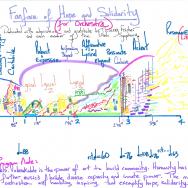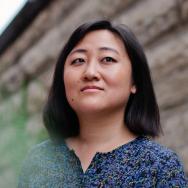Rachel Cohen had never thought of herself as a Jane Austenite. An essayist who teaches English and creative writing at the University of Chicago, her work explores more recent authors such as James Baldwin, and time periods such as the Gilded Age and Civil Rights Era.
However, during a period of her life shaped by the illness and death of her father, Cohen found herself drawn to Austen’s books. For several years, she read almost nothing else.
In her new book Austen Years, Cohen writes of life and reading from the perspective of a memoirist and through the lens of literary criticism. Austen’s writing becomes a guide for Cohen’s reflections in the wake of her father’s passing and, after the births of her two children, as she looks toward the future.
“I was writing about reading Austen in a personal way that a lot of the writing I’ve done hasn’t been,” Cohen said. “The things that I had to say about reading her felt deeply entwined with my actual life.”
In this Q&A, Cohen—a professor of practice in the Department of English Language and Literature and the Program in Creative Writing—discusses her newfound and unexpected relationship with Austen, and how the author’s work continues to affect readers and writers all over the world.
Why did you decide to write this book?
I was very surprised to find myself writing about Jane Austen. I don’t think of myself as an Austen person. I had read her books, but I wasn’t thinking that she would be a preoccupation of mine. In a difficult period of my own life—when I had left my longtime home city of New York, my father was ill and I was also pregnant with my first child—I found that I was reading a lot of Jane Austen. Then my father died, I had a second child, and I was still reading Austen, and so I thought I’d write an essay about reading Jane Austen. That turned into several essays, and then I found that I was writing a book.
Austen’s work often touches on her relationship with her father, as well as family and different life transitions. Do you think that’s what drew you to her?
I do think so. I didn’t realize it at the time, because I didn’t have a sense of what was past the pages of the book—either in terms of the historical background in which they were written or Austen’s life. Usually I write biographically, and it’s always the first thing I’m looking for. In this case, years went by before I looked into that. But when I did, I felt that there was a lot of biographical resonance.
I was especially gripped by her very close relationship with her father. He supported her writing, made sure she had paper and gave her access to his library. All of that was very important, especially for a woman writing during that time. There was a long period when she found it difficult to write, and in the middle of this period her father died, so that was a huge thing for her to recover from. All the novels have those layers of experience in them. Later, I came to feel that’s why the books meant a lot to me. That was a division in my own life. I moved away, my life changed a lot and my father—who had been a large part of my life—had died, so I felt there was a lot of kinship in her biography.
In your book, you mention your interest in how writers of color perceive Austen’s writing. Can you talk a bit more about that?
Having my book come out this summer in the middle of the pandemic and a swell in the Black Lives Matter movement—I couldn’t have known that this would be in the environment in which the book was published. But for many years, I have been thinking about systemic racism and violence. Jane Austen is important to a lot of different readers and writers, and her books are reworked by writers and filmmakers all over the world in many different contexts. I find that interesting, and it’s significant throughout my book.
Some literary critics and readers who I admire write about Austen a lot. Ta-Nehisi Coates has his series of essays about Jane Austen—he calls her “Jane Awesome.” In his writing, he compares Austen’s irreverence and class consciousness to the Golden Age of hip hop, and he thinks about other artists who use irony in the way that she does. Another writer whose work I really learn from is Azar Nafisi. She had this clandestine reading group for women where they read Pride and Prejudice in Tehran. She writes about Austen as a radical voice that represents challenging the ruling ideology in Iran.
There has also been a lot of new research on Austen’s views of abolition and the Atlantic slave trade. There’s very good evidence of Austen’s brothers being very involved in abolition, and their efforts in trying to suppress the slave trade after the 1807 abolitionist slave trade act. But she also learned about abolition independently. All of her favorite writers were abolitionist writers like William Cowper and Samuel Johnson. So, it’s quite clear what her stance was, and it’s important to know in the current context for contemporary readers to have a sense of something she was very committed to in her lifetime. The fact that that has gone missing from our sense of Jane Austen is not really an accurate reflection of her biography. I wrote a piece for The New Yorker—excerpted from the book—about the ways of understanding her novels and their reference to that larger historical context. To have that be part of the conversation this summer was important to me.
Your first two books focused on the lives of other people. How does it feel to release such a personal book?
Although this is the most personal book I’ve written, I have taught a lot of other people’s personal books in creative writing. So, writing this book was continuous with what I had been doing for a while. It’s difficult to be sure how much of your personal life you need as part of writing well, and what the cost may be of having your life and the people who are near you exposed. I was very cautious and discreet about including anybody else’s experiences.
I really tried to say very quiet things about a few people who are nearby, but my father is a character in the book, and that was something I grappled with. He was a really interesting thinker—he was also a university professor, and his ideas were really bound up with things that I thought about in reading Austen. I wanted to honor his ideas about things that he and I had talked about over the years, so this was a way to do that. That was a way that I felt persuaded that it was the right thing to do—that it would honor his memory. So we’ll see if it was the right decision, but I think it was.

